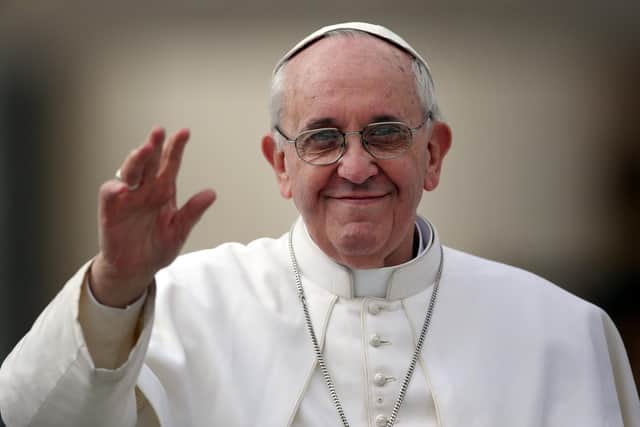Scottish independence: Outsiders, from Rishi Sunak to expat celebrities, seem to want to tell Scotland what to do – Alastair Stewart
I had been living in Spain for a month by the time of the 2014 independence referendum. It was common knowledge I was a columnist, and like a moth to a flame, someone would eventually clock "writer" and "Scottish", and presume I wanted to hear their take on independence.
There was a tremendous Irish-themed bar I'd park myself in on Saturday nights. Every week, some older, leathery-tanned, slightly drunk Englishman usually explained how Scotland was too poor and stupid to try breaking out on her own. They'd sit and explain how the domestic and international climates made it impossible, the currency, or the cost of whatever came to their minds at 11pm.
Advertisement
Hide AdAdvertisement
Hide AdSuch diatribes would be undertaken with such an air of proselytizing condescension to make even the most devoted unionists question their convictions. It continued for years afterwards, at every election, during the Brexit vote, through to the final days of Theresa May's torturous administration, until I returned home.
The situation was a microcosm of the global take on Scotland. International commentators, global celebrities, and civic and religious leaders have a black-and-white position on Scotland. The arguments are generally and inaccurately broken down as a fight between stability or a disruptive, uncertain, should-have-learnt-from Brexit vote.
But my response now is the same as in Spain. Ignore the logic, mandates, and responsibilities of who can hold what referendum, when and where. Do you subscribe to the "principle of equal rights and self-determination of peoples" as outlined in the United Nations Charter?
The gamble of believing in self-determination is people can change their minds about the 'self' they want to live in – a risk inherent to every democracy, with higher stakes for advanced economies with nuclear weapons and geopolitical responsibilities such as Nato. That geopolitical reality for other nations and the precedent it sets will attract attention.
Whether it be presidents, popes, actors, or celebrities, everyone has an angle and a vested interest in the outcome. Those Englishmen in Spain did not want to see the UK "chopped up" because they were worried about what it would mean for their trips to Europe (an irony, given Brexit).


Pope Francis recently put his foot in it by telling Spanish media that "the English resolved the requests from Scotland 'the English way'" regarding independence, while discussing Catalonia.
Cooperation does not equal settlement. No one who understands modern Scotland could safely say the issue is anything but toxic. Certain doses of the debate are fine, but prolonged exposure leads to an irrepressible urge to pull your hair out.
To prove a point, His Holiness looped in contemporary Macedonia. His comment that "the courage of two prime ministers to solve the problem in North Macedonia" was spectacularly off course. The absence of street brawling and riots does not settle an issue, as anyone who understands Balkan politics will attest.
Advertisement
Hide AdAdvertisement
Hide AdThe world is full of pseudo-pop culture/public life commentators who need practical experience of what they're examining. The international array of commentators who think they know what's going on in Scotland are guilty of the same intellectual imperialism that half of them pretend to denounce.
"To learn who rules over you, simply find out who you are not allowed to criticise” is a neat little quote often attributed to Voltaire. Unfortunately, it was said by an American neo-Nazi, Kevin Alfred Strom, in 1993. If there's a lesson there, it should always be to check your facts, especially when it comes to the proliferation of universal wisdom on behalf of other people.
In 2014 the then US President, Barack Obama, said he backed a "strong and united" UK. This is the same man who confused Ireland and Scotland at the COP26 climate summit in 2021 when he claimed he was on the "Emerald Isles". His gaffe came a week after CNN journalist Wolf Blitzer, reporting from Edinburgh, wrongly announced the world was gathering there for the summit, which was in Glasgow. Slips of the tongue, maybe, but there is a pernicious habit of taking endorsements or dismissals by international commentators and using them as part of domestic campaign literature, to say nothing of social media.
The issue worsens when expat actors are repeatedly invited onto Question Time and other shows. Why? What is their expertise about the day-to-day lives of the people who would need to live with the consequences of an independence vote? These people love Scotland so much they choose not to live in it but return to pass summary judgments. It is the worst kind of superficial politics.
That feeling of others dictating to Scotland is one of many why independence will not just disappear as a solution. If Rishi Sunak is seriously considering blocking laws in Scotland that make it easier for people to change gender, he would be committing the most catastrophic denial of Scotland's democratic tradition in 25 years of devolution.
Former First Minister Alex Salmond said in September 2013, "the people who live and work in Scotland are the people most likely to make the right choices for Scotland". He was not wrong.
Sunak's move and the Pope's comments, alongside all the others who profess secret wisdom about what is best for Scotland, are setting another ring of fire around people who are increasingly feeling just a bit too castigated, a bit too ignored, and a bit too angry. "Mind your business" is far too blunt a retort, but as a nation, we should be more selective about who we listen to and a bit more discerning about their angle.
Comments
Want to join the conversation? Please or to comment on this article.